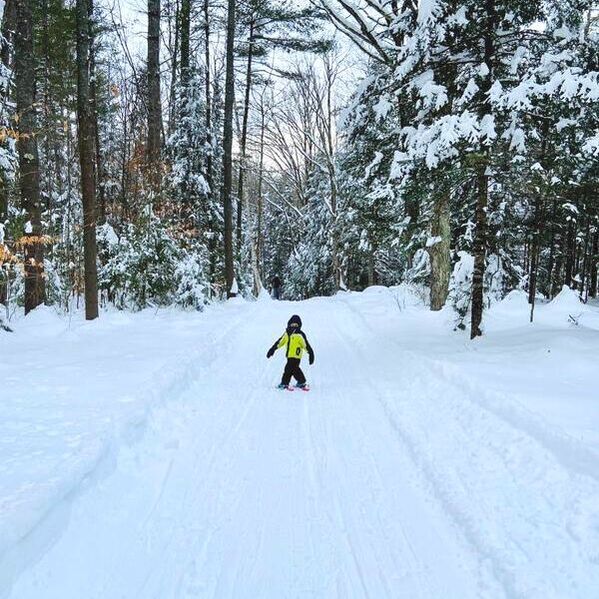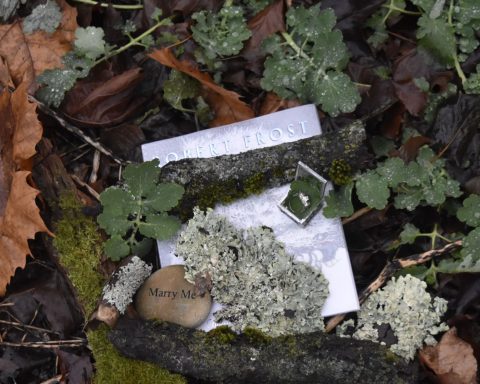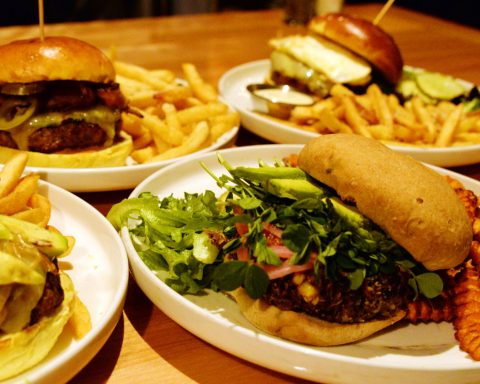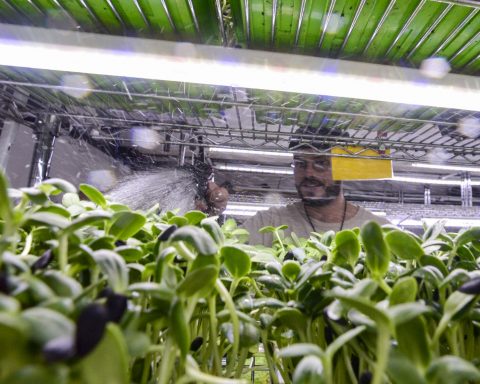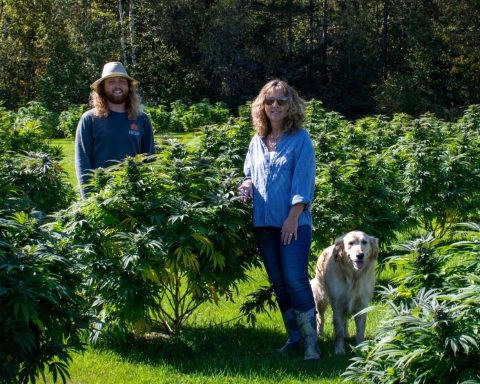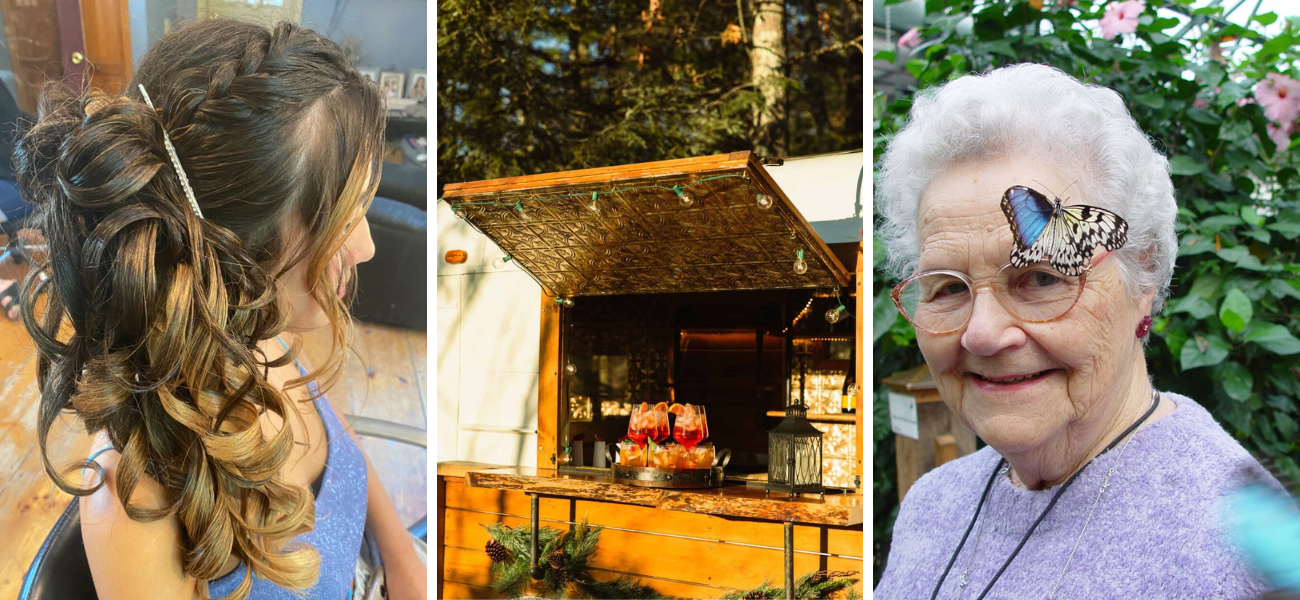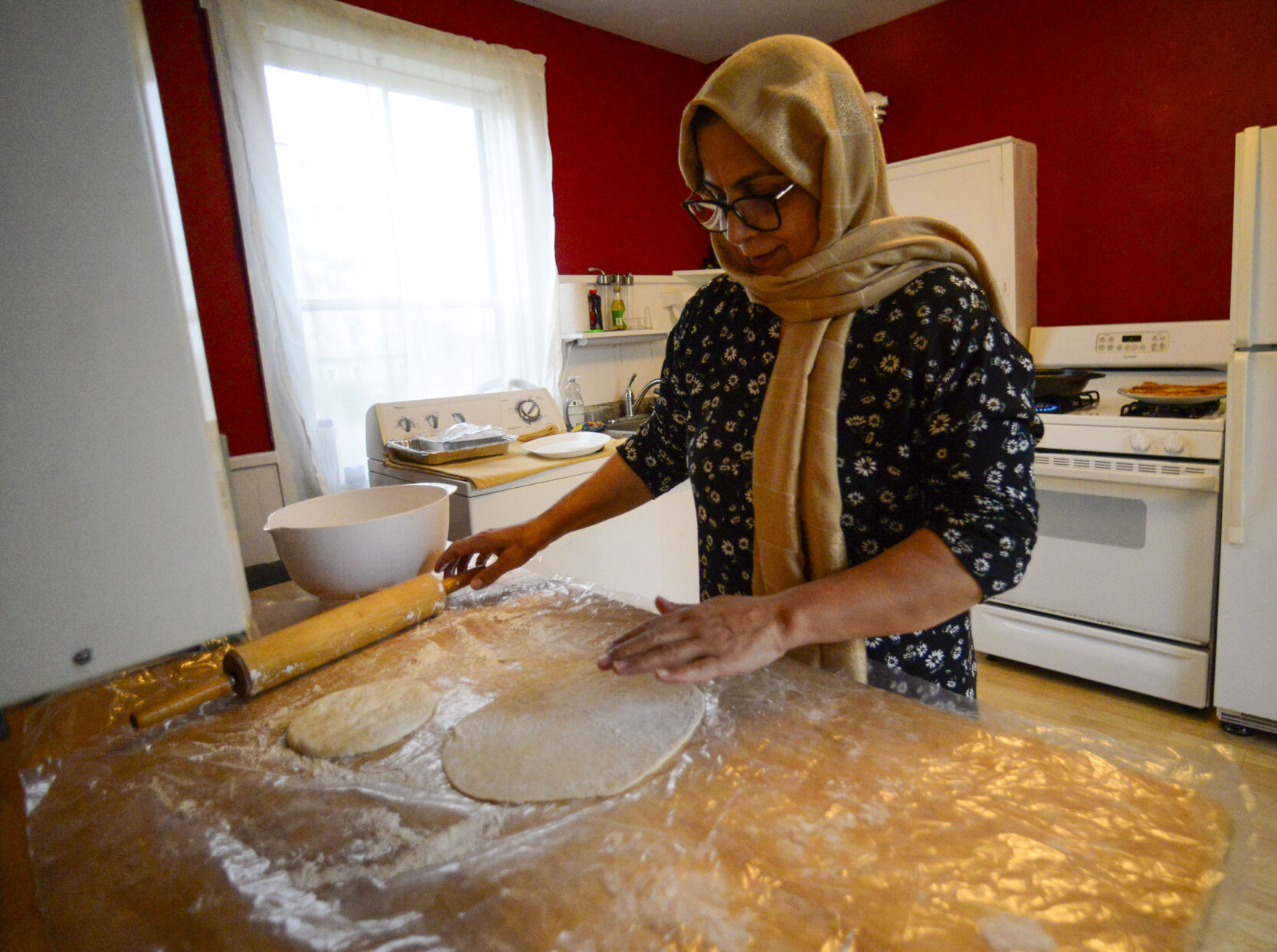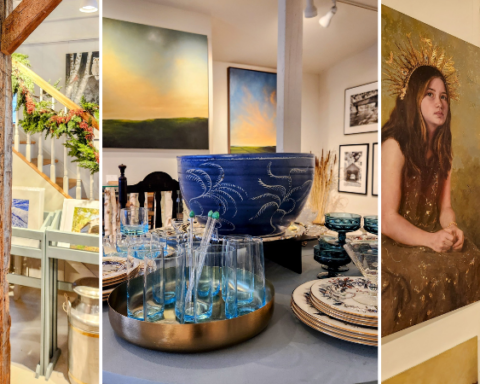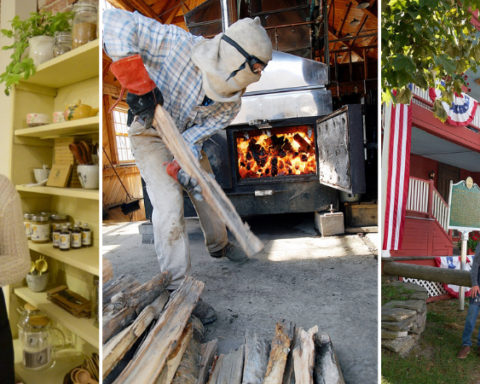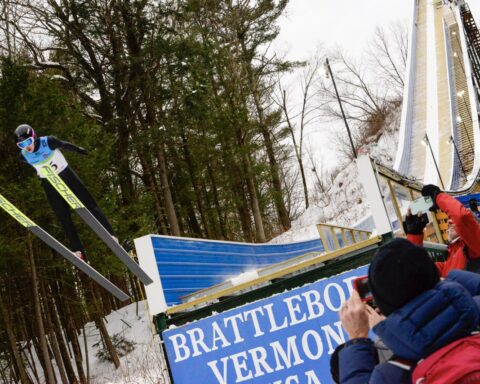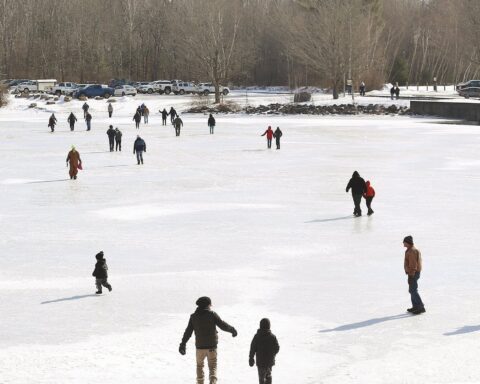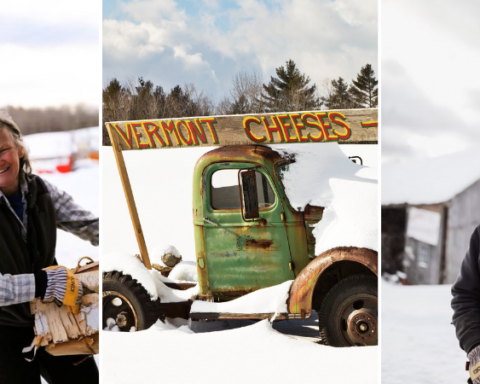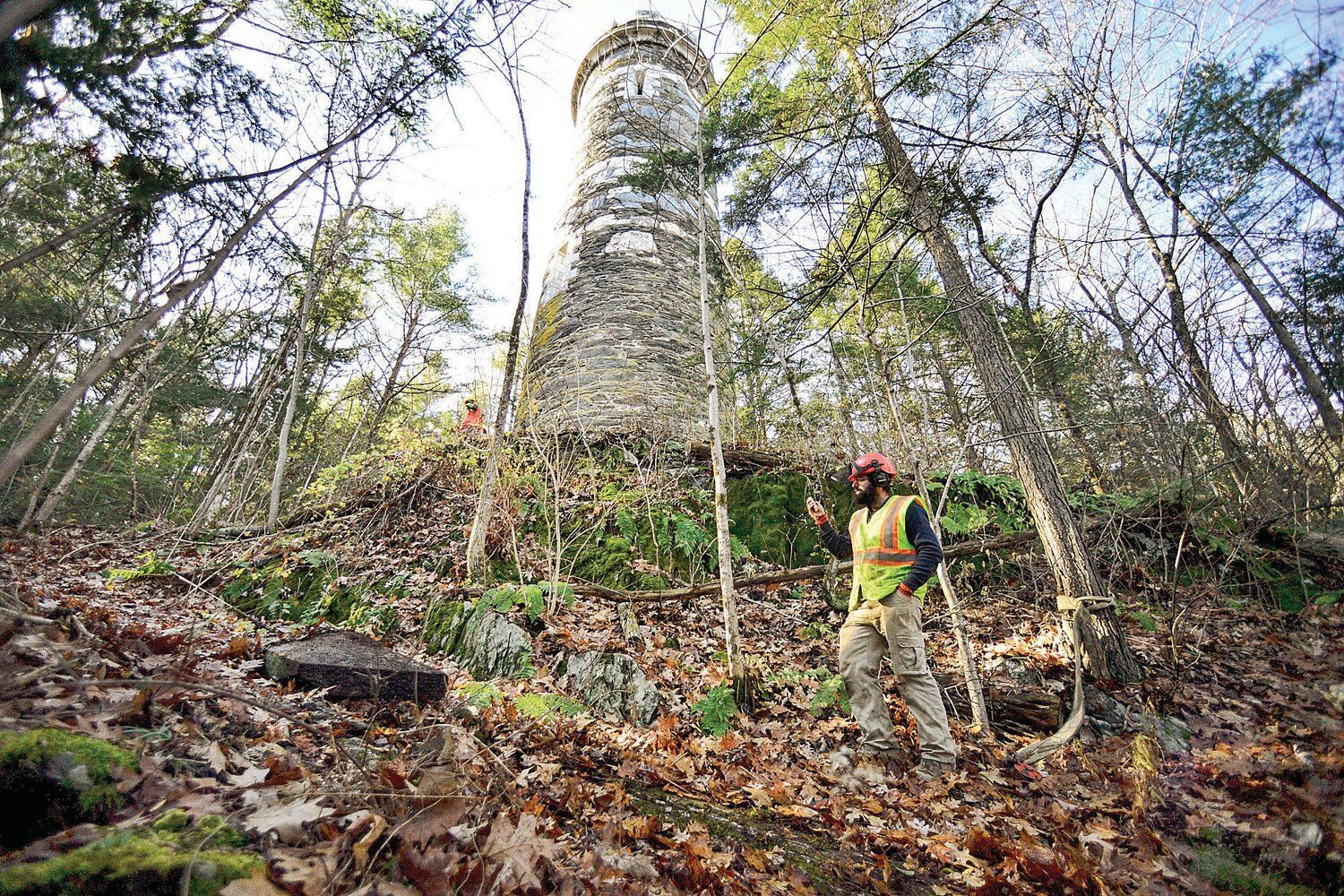By Roberta C. Stone, Vermont Country correspondent.
LONDONDERRY — It is the off-season — the gall. We are standing in the Viking Nordic Center rental shop in Londonderry, Vermont — a cross-country ski mecca.
It’s a throwback from the 1950s as you look around. Concrete floors, old wooden benches, old skis plastered to the ceiling, lots of boots and poles stuck on shelves and leaning against counters. It’s a happy place. A family place, a friends meet friends place.
Some skis adorning the walls and ceiling are probably from the 1800s, “like the ones over there by the door, the wooden ones, are probably homemade,” says Dana McNair, the proprietor, along with her husband, Malcolm.
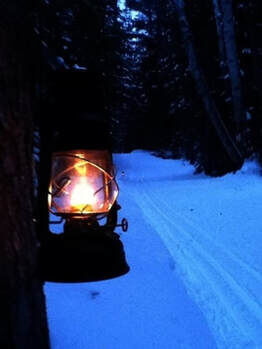
Nordic skiing goes pretty far back in time with its origins dating to 600 BCE in China.
Snowshoes also have a history dating as far back as 4,000 years to when North American Indian tribes wore them to hunt in the snow. It’s an old sport — Nordic skiing is, older than alpine, because for some, it was and still is, a way of life.
That way of life began for the Viking Nordic Center in 1970 when two brothers, Stan and Lee Allaben, began a mail order business called the Nordic Trader where they sold skis from Norway and knickers from England, as well as backpacks and other ski essentials — shipping them all over the country. In order to attract more consumers to visit their retail store, the brothers cut a few trails for limited use.
There was no lodging attached to this property, so it was quite a gamble to make it a cross-country destination. The first couple of years, they took donations in exchange for trail use. When they emptied the sap bucket at the end of the day, they found books, dollars and some joints. Remember: It was the 1970s.
As business grew, the brothers got landowners to offer access to their property (mostly farms and logging roads) and that’s how the center grew into a thriving business with 26km (16 miles) of cross-country trails and 4km (2.5 miles) of snowshoe trails. The McNairs came in 1970 to help new owner, Irving Gross, and have been running it ever since. That’s 53 years and counting.
The Viking Nordic Center is a place where friends and families come for a few hours to enjoy the frosty cold of a Vermont winter.
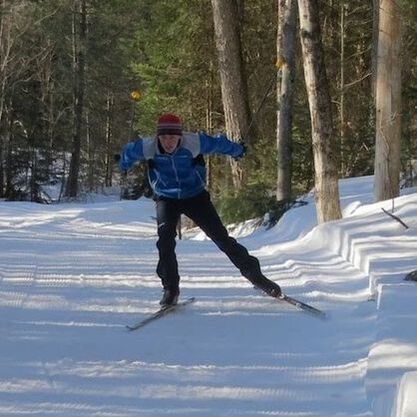
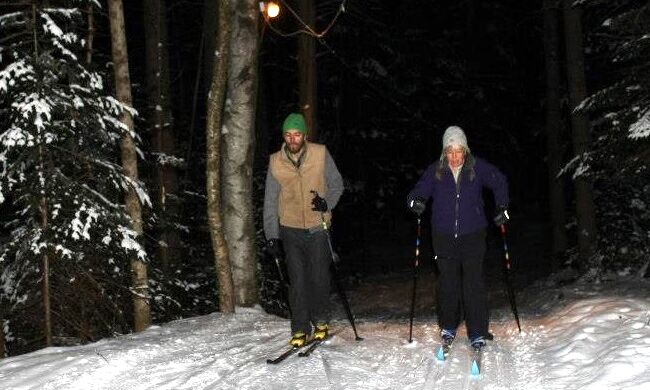
Right: “As a matter of a fact, when we offered night skiing, I thought 30 people coming was a good number, but when I looked out the door, people were lined up. We had 120 people that first night,” recalls Dana McNair.
Photos provided by Viking Nordic Center.
“It is so satisfying to get people excited about skiing again…It makes them happy.”
Dana McNair
Normally, on any winter weekend, the center can put as many as 200 skiers and snowshoe enthusiasts on the 16 miles of groomed trails. For the snowshoers, there are 3 miles of ungroomed trails that cut through the woods. “This gives the snowshoe crowd a more authentic experience,” says McNair. Of course, she points out, snowshoers can use the sides of the groomed trails as well.
The center offers rentals of skis, boots and poles, as well as snowshoes. Then, once outfitted, people can go out and tour the trails on their own. There’s lots to take advantage of once you have your equipment. The Viking offers ski lessons on weekends in the two different types of skiing — the classic technique and skate technique. “We do a lot of get up, fall down lessons,” jokes McNair.
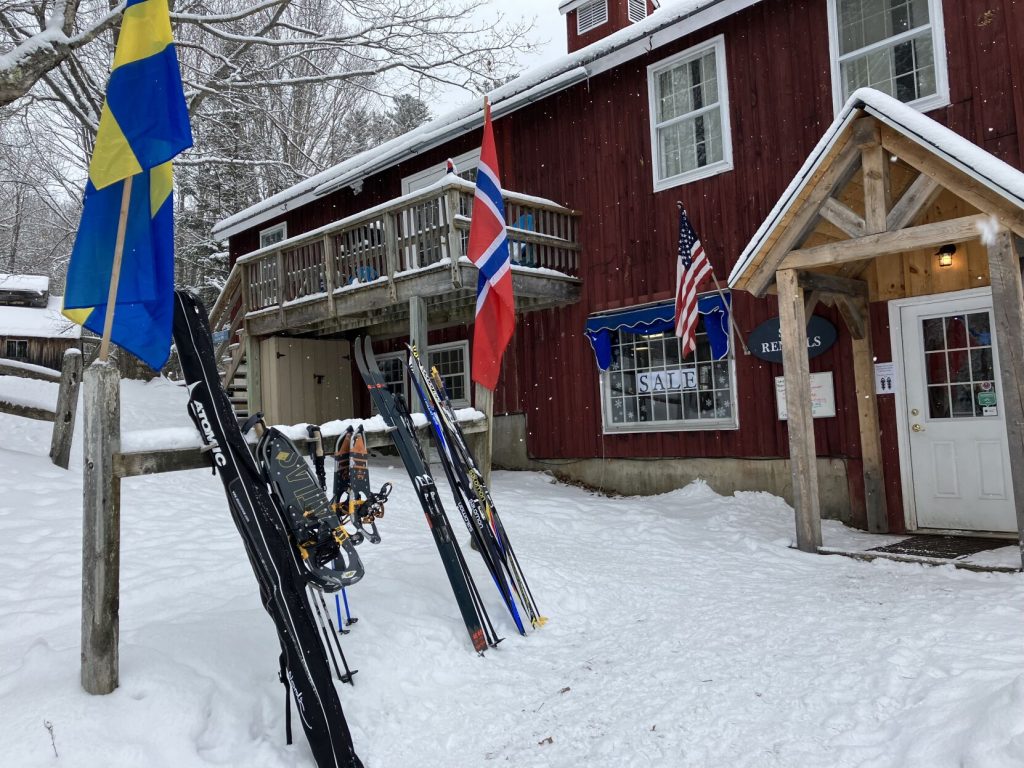
The Bill Koch League practices here once a week.
“It’s a blast, says McNair. “The cars roll in and roll in and roll in. There are kids everywhere. They’re slapping on their skis and running around. Red jackets everywhere.” It seems, according to the proprietor, that skiing at such a young age teaches all kinds of lessons that have little to do with technique and more to do with development. “It’s a great program,” she says.
For those who don’t know, Bill Koch was born (Brattleboro) and raised (Guilford) in Vermont. He is called “one of the most revolutionary Nordic skiers of all time.” He was the first American to bring home a silver medal in a 30km race at the Innsbruck, Austria, 1976 Olympics, which was described by Sports Illustrated magazine as “the greatest upset in Olympic history.” That record wasn’t broken until 2018.
Koch is also known as the “father of skate skiing,” bringing it to the U.S. in 1981, after seeing a competitor beat him using that very technique. He went on to compete in four Olympics in all, achieving unparalleled success in Nordic skiing. When he finished his competition years, Koch started The Bill Koch Youth Ski League (BKL) for the purpose of “introducing young people to the lifelong sport of cross-country skiing to promote health, fitness and social benefits in a safe environment.”
The program has grown to 50 BKL ski leagues all across the East. So, when the Viking Nordic Center hosts the Bill Koch league once a week, it is a big deal. They teach kids at a very young age (2- to 4-years-old are called Lollipoppers).
The older ones compete and are hopeful for more competitions and perhaps the Olympics.
Kids have fun at the Viking even if they just come for the day with their families. There is an activity called the Great Cookie Hunt where kids 12 and under find hidden snowflakes or Viking helmets with a paper punch on it. They must acquire five punches on their card to get a cookie. The kids have a great time doing it and don’t even realize how much exercise they are getting.
There are other opportunities for groups to have fun at the Viking. There is a firepit where they can warm themselves and have a hot chocolate or lunch. Says McNair, “This is where the action really happens — the firepit or the warming hut with a wood stove.”
There is also a Clubhouse that can be rented for a group where they can bring their own food and drink. McNair describes a girls’ weekend last year in the clubhouse — “There were 12 of them and they sounded like they were having a raucous good time,” she says.
In addition to all these activities, sometimes when weather permits, or on special holidays like Christmas and Valentine’s Day, the Viking opens up for night skiing. “When the day crowd leaves,” she says, “the night crowd comes. You can work all day, then grab your family and get out and ski at night — it’s a lot of fun.” There is even a lantern-lit trail called The Tunnel of Love.
Unlike many businesses during the COVID years, her cross-country skiing center thrived.
“During COVID, people were looking for things to do outside, and this was the perfect choice,” McNair says. “As a matter of a fact, when we offered night skiing, I thought 30 people coming was a good number, but when I looked out the door, people were lined up. We had 120 people that first night. All our workers stayed that night to help out and it’s kind of been like that ever since. It’s like people have discovered the beauty of cross-country skiing again.”
Looking at the views of Magic Mountain, Mount Equinox and Stratton, McNair waxes philosophical. “In the world of cross-country skiing, there are two types — the big fancy ones … where people go for a resort experience, and the family-run ones like ours.
“To me, it’s the little centers that are the heart of cross-country skiing; these places have the personalities that people come back to over and over again. We know people who have come back for 20 or 30 years and our winter is not complete until we see them.” They have a personal connection to their patrons, and their patrons have an allegiance to them.
The excitement in her voice is palpable. She loves what she does. It’s not just a livelihood; it’s a life.
If you go …
Viking Nordic Center
615 Little Pond Road
Londonderry, VT
Phone: 802-824-3933
Website: Vikingnordic.com
Roberta Stone is a freelance writer who has written for The New York Times, Connecticut Magazine, the Deerfield Valley News, the Brattleboro Reformer and the Connecticut Post. She is also a children’s book author. She lives in West Dover with her husband, Bob.
